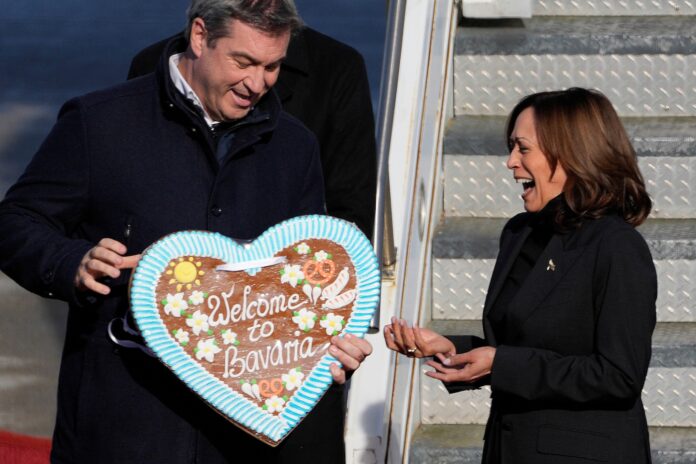Yet a single question seems to hang over this year’s Munich Security Conference: What, exactly, is happening in the United States?
For months now, Europe’s political, security and intelligence establishment has watched nervously as critical Ukraine aid was mired in domestic politics. Their American interlocutors assured them that, ultimately, the bill would pass and money and military equipment would continue to flow.
But the protracted fight over the funding, combined with former president Donald Trump’s claim that he would encourage Russia to attack U.S. allies if they underspend on defense, has jolted Europe, renewing questions about whether the continent can count on the United States — and what to do if it can’t.
In Munich, Vice President Harris and Secretary of State Antony Blinken will try to convince European allies that the U.S. commitment to Ukraine and NATO remains steadfast. But there appear to be few promises they can make about the next few months, let alone the next few years.
They will be joined in Germany by Homeland Security Secretary Alejandro Mayorkas, who is fresh off an unprecedented impeachment that has made him a symbol of U.S. political dysfunction to some here. A group of U.S. senators flying over for the event, meanwhile, will face questions about why Republicans seem to be “owning” Trump’s message about abandoning Ukraine.
Some of those questions could come from Ukrainian President Volodymyr Zelensky, who will swing by Munich after stops in Berlin and Paris on Friday. Those trips are aimed at shoring up longer-term support for Ukraine’s fight — and signaling European resolve.
Europe, for its part, will be doing its best to show U.S. officials — and a certain presidential candidate — that they are holding up their side of the transatlantic bargain.
In Brussels this week, for instance, senior officials, including NATO Secretary General Jens Stoltenberg, played up recent increases in defense spending by NATO members.
In remarks to the press, Stoltenberg insisted that critics such as Trump have a “valid point” when it comes to defense spending, but that the alliance is already moving toward spending more.
“It’s a point and a message that has been conveyed by successive U.S. administrations that European allies and Canada have to spend more, because we haven’t seen fair burden-sharing in the alliance,” Stoltenberg said. “The good news is that this is exactly what NATO allies are now doing.”
NATO saw an 11 percent real increase in defense spending across Europe and Canada last year. This year, 18 of 31 allies will meet the target of spending 2 percent of their GDP on defense, Stoltenberg said.
European leaders recognize the limits of their influence in the U.S. political debate, although many of them are trying to push the conversation anyway.
In recent months, a stream of foreign and defense ministers and senior European officials have undertaken visits to Washington that follow a predictable itinerary. Meetings with administration officials plus whichever congressional Republican lawmakers are amenable. Then they do an event at a conservative think tank, such as the Heritage Foundation or the American Enterprise Institute, trying hard to sway the opinions of the surging isolationist wing of the Republican Party and to bolster the party’s faltering foreign policy hawks.
Many E.U. diplomats hold out hope that the United States will come around, in part because they don’t wish to ponder the alternative. “We believe that the defeat of Russia in Ukraine is a common interest,” said a senior E.U. diplomat, speaking on condition of anonymity to brief the media.
“From what we understand from our U.S. colleagues, there is still possibility that Congress approves,” the diplomat continued. “We hope so — their support will remain much needed over the next months and years.”



